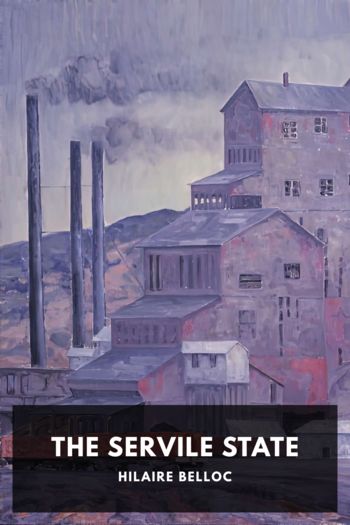The Servile State, Hilaire Belloc [ebook pdf reader for pc TXT] 📗

- Author: Hilaire Belloc
Book online «The Servile State, Hilaire Belloc [ebook pdf reader for pc TXT] 📗». Author Hilaire Belloc
The traveller is the socialist. The south which he desires to reach is the collectivist state. The river is modern “organised reform.” The northern country where the mountain river will ultimately find a quiet bed is a society reposing upon compulsory labour.
A man thus speaking to the traveller would not be denying either the sincerity of his desire to get southward or his belief that the river would lead him there; all he would be denying would be the fact that the river does lead him there.
There is only one discrepancy in this parallel, which is that the traveller in the metaphor could, upon being convinced of his error, leave the river and get south by land. That would correspond in the case of the socialist to a bold policy of confiscation, to a taking of the means of production from the hands of those who now own them and to a placing of them in the hands of politicians to be held in trust for the community.
I nowhere deny in my book that this is ideally possible: just as it is ideally possible that tomorrow all Englishmen shall take and preserve for twenty-four hours a vow of silence. What I say is that nothing like it or approaching it has ever been done or is now being done. I say further, what is of capital importance, that with every step taken along the existing lines of change in our industrial society we are making it more and more difficult to retrace such steps, to abandon the accepted method and to pursue the collectivist ideal. The path of confiscation, the only way by which socialists can reach their goal, gets more and more remote with every new and positive economic reform, undertaken, remember, with the aid and under the advice of socialists themselves.
These, then, are the three main points, I think, upon which there has been misconception and against which I hope I may warn the reader. To recapitulate:—
The misconception that I have used the word “servile” in some rhetorical sense of “irksome” or “oppressive,” whereas I have attempted to use it only under the limits of my definition, viz., that labour is “servile” which is undertaken not in fulfilment of contract but under the compulsion of positive law and which attaches to the status of the labourer, and is performed for the benefit of others who are under no such compulsion.
The misconception that the advent of the servile state is put forward for a warning or a danger-sign: I am concerned in this book to say how and why we are approaching it; not whether we should approach it.
The misconception that I have misstated the aims and the convictions of socialists. These aims and convictions are simple enough, and my point is not that they are either illusions or doubtful, but that in point of fact we are not heading towards them and that the effect of socialist doctrine upon capitalist society is to produce a third thing different from either of its two begetters—to wit, the servile state.
Apart from these three main points I must, in view of certain less intelligent criticisms the book has provoked, mention one or two other matters.
Thus, my argument that slavery was slowly transformed and that the old pagan servile state slowly approached a distributive state under the influence of the Catholic Church is not a piece of special pleading put forward to please my coreligionists. It is a plain piece of historical fact which anyone can verify for himself, and which many do not regard as an advantage, but as a disadvantage inflicted upon humanity by the advent of this religion. Whether the servile institution be a good or a bad thing, it did, as a matter of fact, slowly disappear as Catholic civilisation developed; and it has, as a matter of fact, slowly begun to return where Catholic civilisation has receded.
Nor have I said that the goal of a completely free distributive state was ever reached. I have said that it was in process of formation when the disruption of our united European civilisation in the sixteenth century arrested its development and slowly produced, in this country especially, capitalism in its stead.
Again, examples of state regulation and of state or municipal economic enterprise increasing rapidly among us obviously do not affect my argument. Unless or until these are based upon a policy of confiscation they are no more an example of socialism than the explosion of gunpowder is an example of warfare. They are no more “socialistic efforts” or “beginnings” or “experiments in socialism” than fireworks at the Crystal Palace are “military” efforts or “beginnings” or “experiments in militarism.” socialism would indeed involve such regulations and such municipal enterprise just as war involves the explosion of gunpowder; but they do not form its essence at all. Its essence consists in vesting in trust with the politicians what is now private property. When municipal and state enterprise accompanied by municipal and state regulation is based upon loans instead of confiscation, nay, loans devised to avoid confiscation, it is a negation of socialism; and I have shown that attempts to mask the capitalist character of such operations by the machinery of sinking funds and the rest are logically worthless. You cannot “buy out” capitalism.
I need not point out what steps have been taken, even in the very short time since this book first appeared, in the direction which it is intended to explain. We already have wages boards in one great industry; we shall shortly have them in





Comments (0)